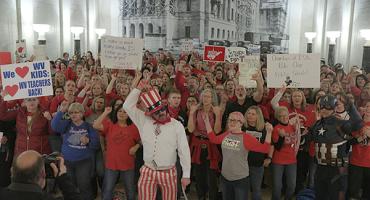Last February, West Virginia’s public school educators and school support staff walked out of their schools to protest the lack of resources their students and schools deserve.
Their historic walkout launched a national wave of teacher strikes that has continued over the past year, spreading to both public and charter schools in states like California, Colorado, Illinois, Ohio and Oklahoma. It also yielded a 5 percent pay raise for West Virginia educators and a commitment from the Legislature to stop underfunding the state’s public schools.
Unfortunately, lawmakers in West Virginia began 2019 by attempting to break that commitment, floating cynical and retaliatory bills that appeared to be driven by outside wealthy interests like Americans for Prosperity, which, like Education Secretary Betsy DeVos, want to privatize public schools. Faced with an omnibus bill that would take money from already underfunded public school districts to pay for charter schools and a voucher scheme, West Virginia teachers went back to the picket lines this week, launching a strike to stop state-sanctioned privatization in its tracks.
As Spring Mills High School teacher Jessica Maunz Salfia wrote in an open letter on the eve of this week’s strike: “Tomorrow, for the second time in my career, I will walk off the job I love. I will leave my classroom and the great work of my life because of the disregard and disrespect of the West Virginia Senate GOP.” Salfia’s letter continues: “Striking is not fun. No teacher wants to be standing outside in the cold being shouted at and spit at. But it is necessary. Because Mitch Carmichael, Craig Blair and Patricia Rucker have decided that PAC money and out-of-state interests are more important than the education of this state’s children. I cannot and will not abide it.”
More than 30,000 teachers joined the latest walkout, converging on the state Capitol to fight for what schools need. Joining AFT-West Virginia members on the picket line Tuesday, AFT President Randi Weingarten thanked the state’s educators for being at the forefront of the national movement to fund public schools, and she cautioned lawmakers and privatization proponents nationwide: “Let West Virginia serve as a lesson to those who feign devotion to our students but do the opposite.”
As teachers, parents and community supporters walked picket lines across the state in rain boots and baseball caps, a sea of red filled the Capitol building to capacity. Inside, teachers chanted “kill the bill” and held signs that read “ALEC go home” and “Déjà vu, Mitchiepoo,” in reference to state Senate President Mitch Carmichael.
West Virginians of all stripes expressed outrage this week at how national special interest groups, funded by the Koch brothers and other longtime allies of Betsy DeVos, were pushing privatization legislation and other measures the state’s voters soundly rebuked in last year’s elections. Though American Legislative Exchange Council-funded “astroturf” groups—like state chapters of Americans for Prosperity and the State Policy Network—sent supporters to the Capitol on Tuesday, they were vastly outnumbered by educators who opposed the Senate’s omnibus education bill.
“We won’t let outside interests rig West Virginia’s politics; silence the voices of teachers, parents and our communities; and defund our students’ public schools,” said Weingarten. “West Virginians want to fund our future, and that’s what the Senate should be focused on.”
After multiple bad-faith attempts to sneak through retaliatory, privatization legislation, West Virginia’s House of Delegates killed the Senate’s omnibus education bill Wednesday night. West Virginia teachers headed back to school on Thursday with a firm commitment from the state’s lawmakers to swiftly take up Gov. Jim Justice’s bill, which would provide all state employees, including teachers and school staff, with a 5 percent pay raise.
Reflecting on the victory, AFT-West Virginia President Fred Albert says he expects that from here on out, West Virginia’s elected officials “will understand that the public wants the ‘public’ in public education.”
[Leilah Mooney]

